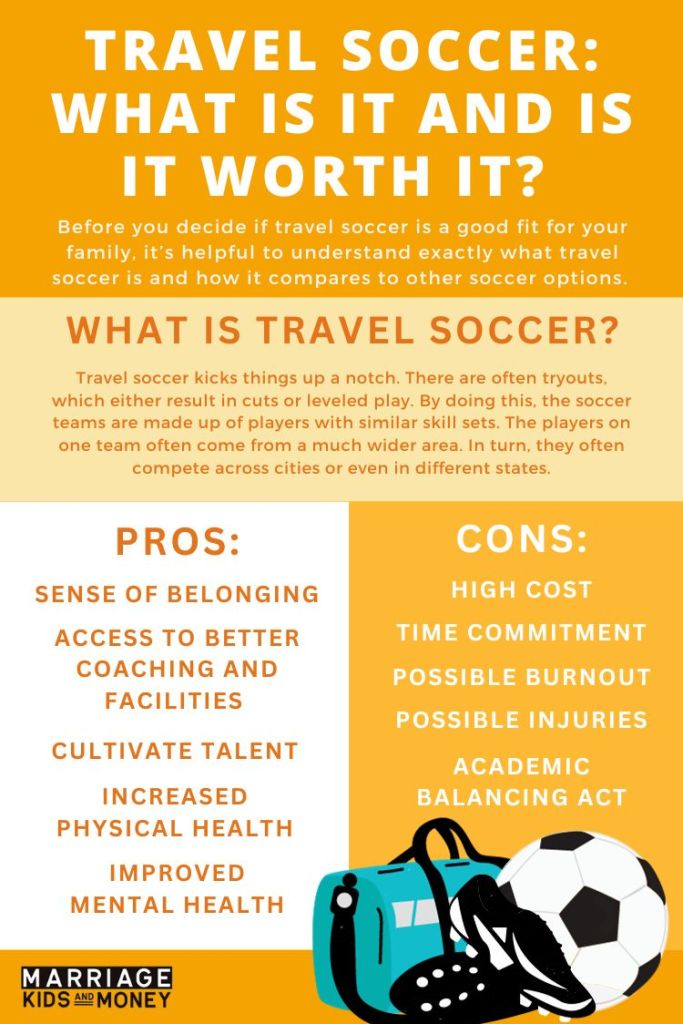In the US, more than half of all kids and teens participate in organized sports. Many of these young athletes choose to play soccer. After all, soccer is the most popular sport in the world, so it makes sense that so many kids want to play it! If someone in your family is contemplating slipping on a pair of cleats, you may be wondering, is travel soccer worth it?
Before you decide if travel soccer is a good fit for your family, it’s helpful to understand exactly what travel soccer is and how it compares to other soccer options.
Then, we’ll dig deeper into the travel soccer pros and cons. And of course, we’ll help you crunch some numbers along the way!
What is Travel Soccer?
Travel soccer goes by several other names. Sometimes, it is called classic, select, or club soccer. Travel soccer takes the sport to the next level.
Your child may start out playing in local competitions at a park district, recreation center, or neighborhood subdivision. On these teams, players come from nearby. Teams are often staffed due to proximity, rather than skill level. That can make for a wide span of talent across each team.
Travel soccer kicks things up a notch. There are often tryouts, which either result in cuts or leveled play. By doing this, the soccer teams are made up of players with similar skill sets. The players on one team often come from a much wider area. In turn, they often compete across cities or even in different states. That’s why they’re called travel teams after all!
Is Travel Soccer Worth It?
In addition to how teams are formed, another big difference between recreational soccer and travel soccer is the cost associated with it.
Families spend an average of around $1,188 a year on soccer costs, and travel soccer can cost $2,000 or more. Personally, our family paid $2,000 just for the team initiation fee this season.
That number might be staggering compared to what you pay in park district fees. Remember that in addition to league and tournament fees, there are costs associated with uniforms, equipment, transportation, and overnight accommodations. When you factor in all of those things, it’s easy to see how travel soccer can rack up such a hefty price tag.
“Is travel soccer worth it?” That’s one of the first questions people ask when they hear about the cost of the sport. To help you see if travel soccer is worth it for your family, let’s dive into the pros and cons of travel soccer.
Travel Soccer Pros

There are countless benefits to playing on a travel soccer team. From improved health to a sense of belonging, these are some of our favorite travel soccer pros.
Sense of Belonging
We’ve all heard the saying that teamwork makes the dream work. Travel soccer is no exception.
Kids and teens can cultivate a true sense of belonging on their travel soccer teams. Because these players tend to play together for multiple seasons and often spend tournament weekends together, they get to know one another well. On a personal note, our daughter has made some incredible friends after joining her travel team for the last two years.
This sense of belonging and understanding of how to be part of a team can have myriad benefits even off the soccer field.
Kids and teens who learn to collaborate more effectively will find success in school and beyond. Playing on a team teaches kids how to respect their peers and make decisions for the greater good of the team. This selfless behavior is something that will benefit players well into adulthood.
This reason along makes me more than willing to say yes to the soccer dad life!
Access to Better Coaching and Facilities
This is not to say that there aren’t talented coaches everywhere. There are! But travel soccer leagues often have more funding and more marketing power to attract talented and professional coaching staff.
While we are in serious awe of all the talented moms, dads, and other relatives who head up their kids’ recreational teams, a professional staff often has access to resources that other teams do not. In addition to the head coach, travel soccer teams might have assistant coaches, as well as other support staff within their training facility.
Speaking of training facilities, having dedicated space and equipment to train on can also make for better coaching. Whether it’s field space that you don’t have to share with other sports teams or conditioning equipment to improve speed and strength, travel soccer often affords players access to better coaching and facilities.
Cultivate Talent
Travel soccer helps kids and teens improve their performance more dramatically than recreational teams. In addition to having access to better coaching talent and dedicated facilities, travel soccer players often have more practice and game opportunities. More time on the field means more opportunities to increase their talent.
Additionally, travel soccer teams are typically leveled. That means that most players are playing at or around a similar level. This similar talent level can lead to more focused drills, targeted practices, and more effective conditioning.
Increased Physical Health
In addition to benefiting their mental health, travel soccer can also improve players’ physical health. Recently, there has been mounting concern over the amount of time that kids and teens spend on the couch.
With research calling sitting the new smoking, it makes sense that we want young people to get up and moving–and stay that way! Travel soccer can certainly help!
In addition to improved cardiovascular health, travel soccer training can also sometimes have a weight-building component.
Improved Mental Health
What if you’re not looking to raise the most talented soccer player? Does that mean that you should pass on the sport?
There’s a huge benefit that comes with organized sports that has very little to do with athletic ability! With growing concerns about young people’s mental health, it might ease a lot of parents’ minds to know that sports can greatly improve players’ mental health.
In a recent study, data researchers found reports that young people who played team sports were less likely to experience mental health difficulties based on data reported by their families.
That means that parents observed fewer incidents of depression, anxiety, or social withdrawal. Families also reported that these kids were less likely to have attention problems.
Travel Soccer Cons

Travel soccer can be hugely advantageous when it comes to players’ mental and physical health. It is also an opportunity for kids and teens to really cultivate their skills. However, all the pros to travel soccer come with a cost.
There are several cons of travel soccer that you should be aware of as well.
High Cost
There’s no denying the fact that travel sports, including travel soccer, can cost significantly more money than recreational league or park district sports.
There are other costs as well. Players need uniforms and other equipment, like cleats and shin guards.
Most noticeable, though, are the sometimes overlooked costs of traveling for travel soccer. Whether driving or flying, there is a transportation cost for players and their families. Then, people need to figure out accommodations for the tournament weekends. This often means staying in hotels or Air BnBs.
While travel hacking can make this somewhat more affordable, the fact that you don’t have a flexible schedule can make it difficult to optimize for redeeming your points and miles.
Time Commitment
In addition to the cost of travel soccer, there is a significant time commitment as well. Travel soccer often requires multiple practices per week, if not daily practice sessions.
Then, there are games and tournaments. Even when these competitions happen on the weekend, that is still a big time commitment.
It’s important to look at this from your entire family’s perspective, not just the one family member. Even if soccer fits into your child’s schedule, you want to make sure it fits into your schedule as well. In addition to needing rides and supervision, your child will likely want support as well. Make sure that you can commit to those hours each week before signing up.
And if you do sign up, work with other families to see how you can share the time commitment. Maybe you can set up a carpool or find other ways to make getting to and from practice and tournaments a more streamlined process.
Possible Burnout
Sometimes something that takes up a significant portion of our lives can lead to burnout. We know that this is true as adults. Kids and teenagers are no exception.
It’s really important to make sure that your child wants to play soccer before signing up for it. If their heart isn’t in it, that can lead to burnout and resentment. No one wants more tension in their household.
Look for signs of burnout and don’t be afraid to help your child call it quits at the end of a season if the sport no longer serves them.
Possible Injuries
Oftentimes, more elite competitors see more significant injuries. Soccer is no exception. Ankle and knee sprains are the most common soccer injuries. Players may also experience foot or wrist fractures, meniscal tears, or even concussions.
Making sure that practice and pre-game warm-ups include cardio and stretching can go a long way in preventing injuries. You can also make sure that your child isn’t playing when they are overtired. This is often when athletes are most injury-prone.
Of course, it’s possible to suffer an injury at any level of play. And it’s also possible to have a long sports career and avoid most, if not all, injuries!
Academic Balancing Act
One of the steepest learning curves when it comes to travel soccer has little to do with the sport itself. Instead, players have to learn how to balance the intense playing requirements with other aspects of their lives.
While homework might not play a big role in kids’ lives in elementary school, by the time they are in middle school and high school, they often have a fairly big academic workload. Sometimes, it is difficult for players to balance their busy sports schedule with their academic workload. Or even having enough time to rest so that they can bring their A-game into the classroom as well.
This doesn’t mean that travel soccer isn’t right for your child. It’s just one more thing to be aware of before you join!
Making Room In Your Budget

Did you decide that travel soccer is worth it for your family? Excellent! Remember that growing your family tree is all about finding ways to use money to serve your family. It’s not about deprivation!
If soccer is something that your family wants to do, there are ways to make it happen. Once your family agrees to add something like travel soccer to your plans, make sure you also add it to your budget. To help, you can create or re-calibrate your budget using one of our favorite budgeting apps.
Another one of our favorite ways to make room for something you love is by using a special kind of savings. You can set up a sinking fund to cover the cost of soccer–or anything else really. Get the full scoop on sinking funds here!
You can also look for ways to grow your income or eliminate other expenses. This can be tricky at first, but tracking your spending and then honestly evaluating where your money went each month can be very eye-opening!
Work together as a family to identify your priorities and values. Then, find a way to make your money and your budget serve those.
While you still have to pay your bills each month and save for retirement, you can also identify places where you might be spending on things that you don’t value. If you find yourself in that situation, decide together on what you can eliminate. Then, redirect the money to where you really want to spend it!
Final Thoughts: Is Travel Soccer Worth it?
Ultimately, only your family can determine if travel soccer is worth it. While the cost can sometimes feel staggering, it’s important to look past the price tag. There are so many positive and life changing benefits to joining a travel soccer team.
By considering both the pros and cons, you can get a better sense of how travel soccer might impact your life.
Is travel soccer worth it to you? Does anyone in your family play a travel sport? How do you handle extracurricular costs?
Please let us know in the comments below.

